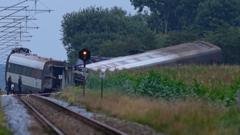As journalists arrived at the Soroka Medical Center in Beersheba, the aftermath of the missile strike became alarmingly evident. Thick clouds of black smoke rose from the decimated building, and twisted shrapnel littered a wide area surrounding the hospital. Emergency services swarmed the site, and the air was thick with the acrid smell of burning materials.
Israeli Hospital Devastated by Iranian Missile Strike: Eyewitness Accounts and Responses

Israeli Hospital Devastated by Iranian Missile Strike: Eyewitness Accounts and Responses
A firsthand account reveals the chaos and destruction following a missile strike on Soroka Medical Center amidst rising tensions between Israel and Iran.
Alon Uzi, a patient at the hospital during the explosion, recounted his traumatic experience, stating, "I was lying in bed... The ceiling fell in." He described a scene of pandemonium, emphasizing that he had no opportunity to reach safety as the blast shattered his world, leaving him covered in debris.
Inside, the emergency reception echoed with the cries of patients being evacuated on stretchers. As rescue teams delved deeper into the chaos, they discovered that many individuals had been successfully relocated to safer underground shelters shortly before the strike.
Professor Asher Bashiri, director of the maternity ward, described the surreal sight of devastation from his office, declaring, "It looks unbelievable." He was optimistic, relieved that most patients had been moved, but acknowledged the constant fear over what the immediate future might hold.
The hospital director, Shlomi Codish, reported extensive damage, stating, “We expect that we will be transferring over 200 patients in the next few hours to other medical centres.” Officials maintained a watchful eye on the structural integrity of the hospital, fearing further collapses.
Culture Minister Miki Zohar, among various ministers visiting the site, condemned the attack, referring to the Iranian regime as one that seeks to harm innocents. His remarks resonated with the urgency of the situation, as he reiterated that Israel would respond with significant force.
In the backdrop of escalating military tension, Israeli leaders have voiced strong accusations against Iran for war crimes and targeting civilians. They pledged to hold the Iranian government accountable while deliberating the potential of expanded military action.
The recent strike on the Soroka Medical Center marks a crucial juncture in this unfolding conflict, highlighting the volatility that exists and the precarious balance between both nations amidst fears of further escalation. The U.S. also looms in the backdrop, contemplating its role and strategy in this increasingly complex scenario.
As this crisis unfolds, the world watches closely, discerning how these events might shape the geopolitical landscape in the region.
Inside, the emergency reception echoed with the cries of patients being evacuated on stretchers. As rescue teams delved deeper into the chaos, they discovered that many individuals had been successfully relocated to safer underground shelters shortly before the strike.
Professor Asher Bashiri, director of the maternity ward, described the surreal sight of devastation from his office, declaring, "It looks unbelievable." He was optimistic, relieved that most patients had been moved, but acknowledged the constant fear over what the immediate future might hold.
The hospital director, Shlomi Codish, reported extensive damage, stating, “We expect that we will be transferring over 200 patients in the next few hours to other medical centres.” Officials maintained a watchful eye on the structural integrity of the hospital, fearing further collapses.
Culture Minister Miki Zohar, among various ministers visiting the site, condemned the attack, referring to the Iranian regime as one that seeks to harm innocents. His remarks resonated with the urgency of the situation, as he reiterated that Israel would respond with significant force.
In the backdrop of escalating military tension, Israeli leaders have voiced strong accusations against Iran for war crimes and targeting civilians. They pledged to hold the Iranian government accountable while deliberating the potential of expanded military action.
The recent strike on the Soroka Medical Center marks a crucial juncture in this unfolding conflict, highlighting the volatility that exists and the precarious balance between both nations amidst fears of further escalation. The U.S. also looms in the backdrop, contemplating its role and strategy in this increasingly complex scenario.
As this crisis unfolds, the world watches closely, discerning how these events might shape the geopolitical landscape in the region.





















